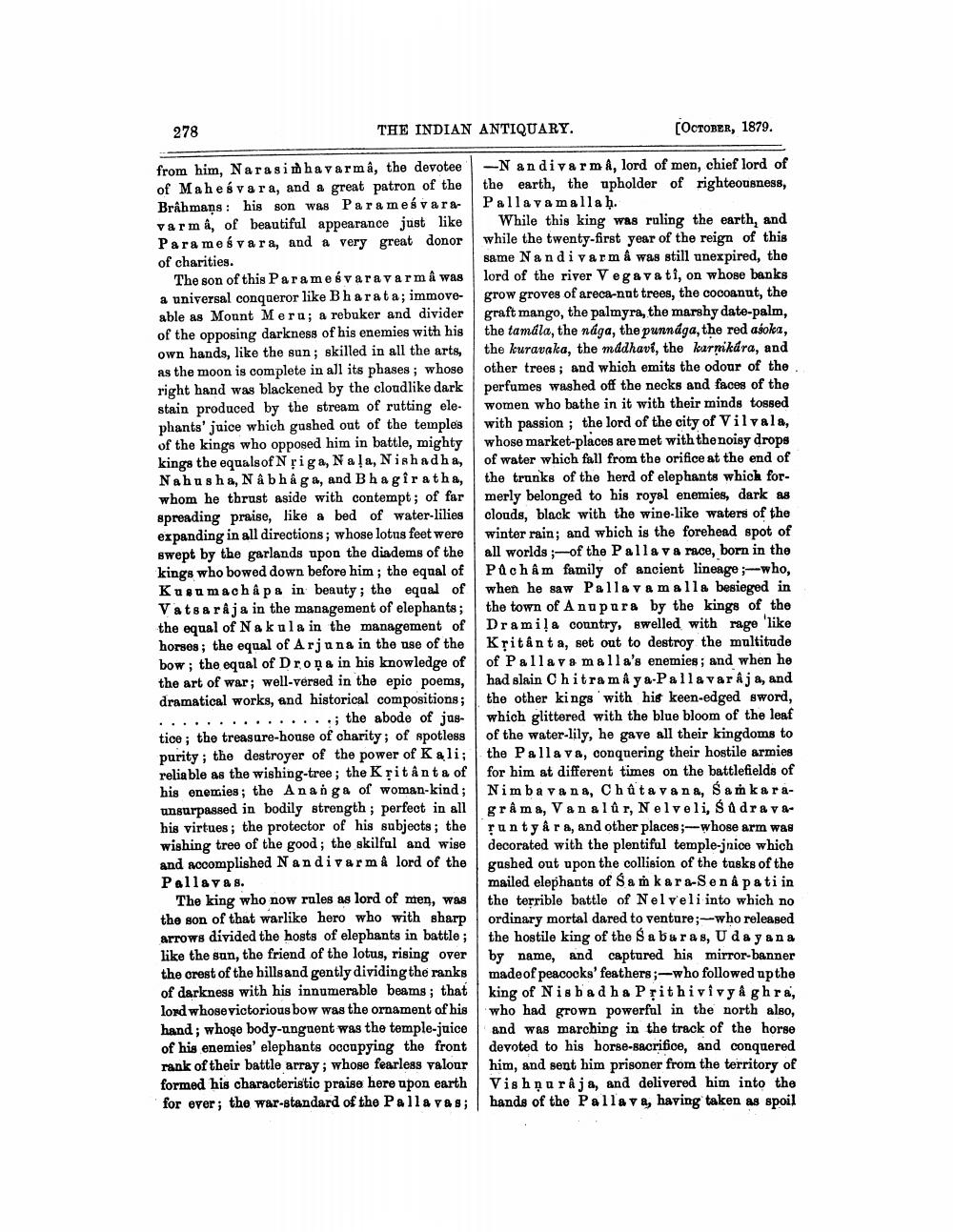________________
278
THE INDIAN ANTIQUARY.
from him, Narasimhavarmâ, the devotee of Mahesvara, and a great patron of the Brahmans his son was Paramesvara varma, of beautiful appearance just like Paramesvara, and a very great donor of charities.
The son of this Parameévaravarmâ was a universal conqueror like Bharata; immoveable as Mount Meru; a rebuker and divider of the opposing darkness of his enemies with his own hands, like the sun; skilled in all the arts, as the moon is complete in all its phases; whose right hand was blackened by the cloudlike dark stain produced by the stream of rutting elephants' juice which gushed out of the temples of the kings who opposed him in battle, mighty kings the equals of Nriga, Nala, Nishadha, Nahusha, Nâ bhaga, and Bhagiratha, whom he thrust aside with contempt; of far spreading praise, like a bed of water-lilies expanding in all directions; whose lotus feet were swept by the garlands upon the diadems of the kings who bowed down before him; the equal of Kusumachapa in beauty; the equal of Vatsaraja in the management of elephants; the equal of Na kula in the management of horses; the equal of Arjuna in the use of the bow; the equal of Drona in his knowledge of the art of war; well-versed in the epic poems, dramatical works, and historical compositions; ; the abode of justice; the treasure-house of charity; of spotless purity; the destroyer of the power of Kali; reliable as the wishing-tree; the Kritânta of his enemies; the Ananga of woman-kind; unsurpassed in bodily strength; perfect in all his virtues; the protector of his subjects; the wishing tree of the good; the skilful and wise and accomplished Nandivarmâ lord of the Pallavas.
[OCTOBER, 1879.
-Nandivar m â, lord of men, chief lord of the earth, the upholder of righteousness, Pallavamallah.
While this king was ruling the earth, and while the twenty-first year of the reign of this same Nandivarm & was still unexpired, the lord of the river Vegavati, on whose banks grow groves of areca-nut trees, the cocoanut, the graft mango, the palmyra, the marshy date-palm, the tamala, the naga, the punnaga, the red asoka, the kuravaka, the madhavi, the karikára, and other trees; and which emits the odour of the perfumes washed off the necks and faces of the women who bathe in it with their minds tossed with passion; the lord of the city of Vilvala, whose market-places are met with the noisy drops of water which fall from the orifice at the end of the trunks of the herd of elephants which formerly belonged to his royal enemies, dark as clouds, black with the wine-like waters of the winter rain; and which is the forehead spot of all worlds;-of the Pallava race, born in the Puchâm family of ancient lineage ;-who, when he saw Pallava malla besieged in the town of Anupura by the kings of the Dramila country, swelled with rage 'like Kritânta, set out to destroy the multitude of Pallava malla's enemies; and when he had slain Chitra mâya-Pallavaraja, and the other kings with his keen-edged sword, which glittered with the blue bloom of the leaf of the water-lily, he gave all their kingdoms to the Pallava, conquering their hostile armies for him at different times on the battlefields of Nimbavana, Châtavana, Samkaragrama, Van alûr, Nelveli, Śûdravarun ty â r a, and other places;-whose arm was decorated with the plentiful temple-jnice which gushed out upon the collision of the tusks of the mailed elephants of Sam kara-Senapati in the terrible battle of Nelveli into which no ordinary mortal dared to venture;-who released the hostile king of the Sabaras, Udayana by name, and captured his mirror-banner made of peacocks' feathers;-who followed up the king of Nis badha Prithivi vya ghra, who had grown powerful in the north also, and was marching in the track of the horse devoted to his horse-sacrifice, and conquered him, and sent him prisoner from the territory of Vishnu raja, and delivered him into the hands of the Pallava, having taken as spoil
The king who now rules as lord of men, was the son of that warlike hero who with sharp arrows divided the hosts of elephants in battle; like the sun, the friend of the lotus, rising over the crest of the hills and gently dividing the ranks of darkness with his innumerable beams; that lord whose victorious bow was the ornament of his hand; whose body-unguent was the temple-juice of his enemies' elephants occupying the front rank of their battle array; whose fearless valour formed his characteristic praise here upon earth for ever; the war-standard of the Pallavas;




